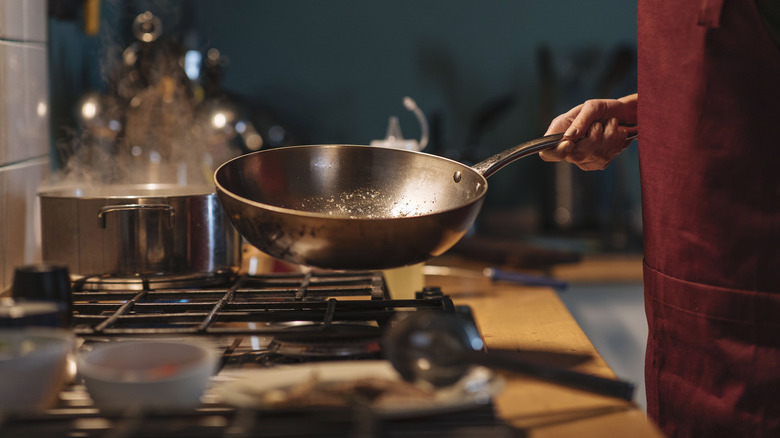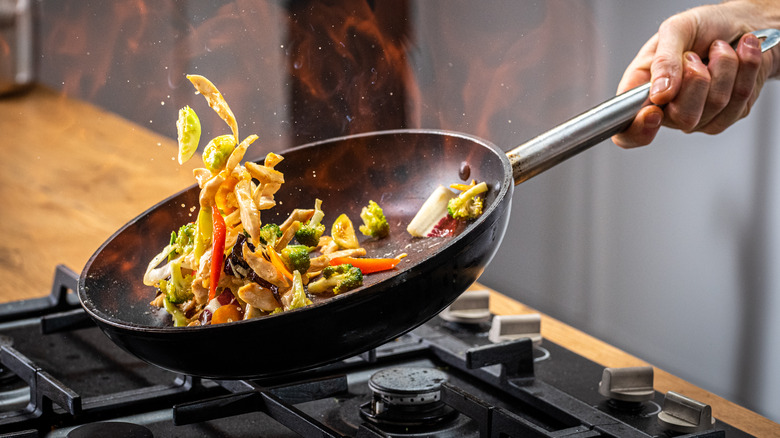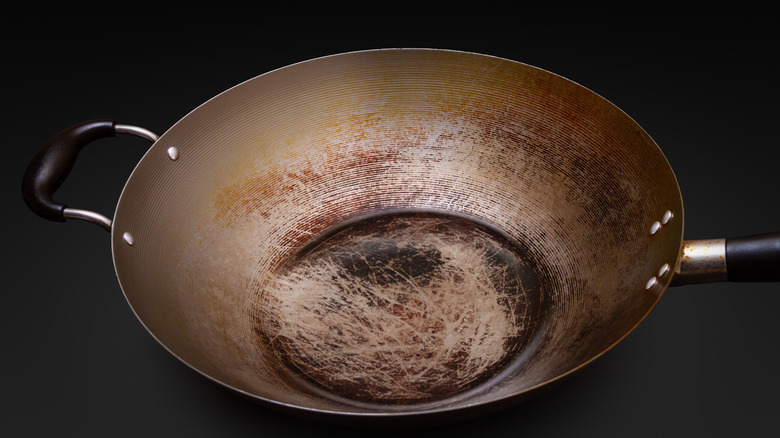Here's How To Properly Clean That Dirty Wok
A well-seasoned wok is more than just a useful cooking utensil: It's an indispensable tool in the alchemical act that is good cooking. In fact, Chinese lovers of stir fry even have a name for that exquisite smoky aroma emanating from Cantonese dishes made in a wok by an expert: wok hei, which translates literally to "breath of a wok." Since a seasoned wok's two worst enemies are moisture and detergents, you might be afraid to clean yours, even if there are stuck-on pieces of food. No need to worry, though — you can keep your wok clean and well-seasoned at the same time, and the process is seriously easy. After it's cooled down a bit, rinse your recently used wok with hot water (dislodging stuck-on food by giving it a little scrape with the spatula you just cooked with), and then dry thoroughly over heat. That's it.
All of this, by the way, depends on you using the best kind of wok; that is to say, one made from carbon steel or cast iron. While aluminum woks are okay, nonstick ones literally can't take the heat and should therefore get out of the kitchen. Also don't ever — and we mean ever — put your wok in the dishwasher, which will completely ruin a perfectly seasoned wok.
Preserving the wok's patina
After covering the "how's" of cleaning a wok; let's turn to the "why's." Avoiding dish soaps is key to maintaining the patina, the nonstick coating a wok develops after multiple uses or oiling sessions. This patina is made of hardened, or polymerized, oils, which bond to and seal the wok's metal surface at high temperatures. Dishwasher detergent (or even extensive use of regular dish detergent) will dissolve those oily bonds, destroying the patina buildup. Having said that, it is okay to use a little mild dish detergent if you feel the need, but it's best to try to avoid it. Oh, and don't worry about creating a few scratches from scraping or light scrubbing — consider them like marks in fine leather. Stubborn stuck-on food can often be dislodged by putting water in the wok and boiling it for a few minutes.
Unless you're using your wok every day, it's a good idea to season it before putting it away for the night after use. This is also a very simple process: Heat the clean, dry wok over medium-high heat and apply a little oil with a paper towel. Keep the oiled wok over the heat for a few minutes, wiping away excess oil (it's okay if it smokes a little — that's the polymerization in process). Remove from the heat, and when your wok is cool to the touch, it can be put away until your next stir fry session.
Rust never sleeps
Both carbon steel and cast iron woks are prone to rust — a flavor you don't want in your food. This is why you want your wok to be thoroughly dry before putting it away. Preferably, it's been wiped dry and then subjected to the heat from a still-cooling burner, as a wok stored wet is guaranteed to rust. This is also the reason you should never soak a wok for more than five minutes or so, because porous metals will absorb water just as easily as oil.
It's usually the case that the more you use a kitchen utensil, the sooner you're hastening its demise: after all, there's no such thing as heirloom wooden spoons. But in this sense, a well-loved wok, like a well-seasoned cast iron skillet, can be passed down through generations. Just remember: some hot water, a little scrub, a good dry, and a coating of oil is all you need to make this particular friend for life.


